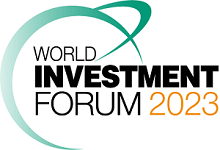The UN Conference on Trade and Development (UNCTAD) is gearing up to host the World Investment Forum 2023, a global event aimed at rallying investments to tackle pressing challenges such as climate action, clean energy, healthcare, food security, and more.
With heads of state, government ministers, and CEOs of leading companies coming together, the forum is a unique opportunity for Africa to take its place on the world stage. More than 50 government officials, over 150 CEOs, and thousands of stakeholders will join forces across 130 events to tackle the challenges that directly impact our continent.
UNCTAD Secretary-General Rebeca Grynspan emphasised the need for global investment stakeholders to come together and channel funds into vital sectors to combat ongoing crises.
Read also: UN women envoy to meet Nigerian private sector leaders
Challenges Facing Global Investment
UNCTAD’s World Investment Report 2023 highlights that the overlapping challenges of war, high food and energy prices, and mounting debt pressures have already had a significant impact on global foreign direct investment, which declined by 12% in 2022. These crises greatly reverberate across Africa, affecting the continent’s economies, industries, and livelihoods.
Dr. Thani Al Zeyoudi, minister of state for foreign trade in the United Arab Emirates (UAE), stressed the role UNCTAD can play in addressing these interconnected issues. He maintained that balancing prosperity and sustainability requires innovation, investment, and strong will, especially in the face of inflation, geopolitical uncertainty, and climate change.
Closing the Energy Transition Gap
One of the critical discussions at the Forum will revolve around climate action. It’s an opportunity for Africa to address its energy transition gap. Developing nations on the continent face an annual investment gap of $2.2 trillion to shift to low-carbon energy sources.
By participating in this forum, African nations alongside nations in other continents can work toward strategies and investments that will accelerate clean energy solutions which is a vital step in mitigating climate change.
Harnessing Sustainable Finance, Healthcare and Food Security
The forum will delve into how the sustainable finance market can contribute to building a low-carbon future and drive investment in sustainable energy. Despite economic challenges like high inflation and rising interest rates, the global sustainable finance market, including bonds, funds, and voluntary carbon markets, reached $5.8 trillion in 2022. This remarkable growth highlights the increasing interest in sustainable investments.
The World Investment Forum will also explore opportunities to increase investments in healthcare and agrifood systems. Developing countries require at least $100 billion annually to enhance healthcare facilities and infrastructure. With Africa countries’ healthcare systems needing substantial investments, these opportunities have the potential to bolster the Sub-Saharan economies.
Additionally, the forum will discuss strategies to boost public and private sector investments in agrifood systems. Transforming these systems can help reduce food insecurity, create rural employment opportunities, and increase incomes while also addressing climate change and biodiversity loss.
The World Investment Forum 2023 aims to provide countries with a platform to turn their investment facilitation plans into tangible actions and reforms. Participants will explore ways to make investment facilitation services inclusive and tailored to the specific needs of various sectors and investor groups with a significant development impact.
As James Zhan, the UNCTAD director who’s in charge of the World Investment Forum, said: “This is a golden opportunity for developing countries to examine how they can bridge investment gaps through more efficient investment promotion and facilitation.”
This global forum is not just another international event; it’s a call to action for Africa. It’s an opportunity for the continent to be better positioned, shape its future, address pressing challenges, and mobilise investments for a sustainable and prosperous future.
